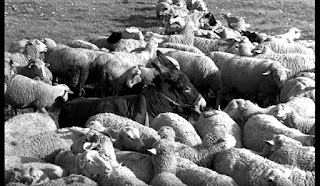Film: The spiritual virtues of massed sheep, with Schubert
In an earlier blog, I wrote about Die Materie, a musical-dramatic-zoological performance at the Armory in Manhattan, whose climax involved 200 sheep on the stage (see my post of 30 March 2016 for more). This immediately came to mind last night when I viewed Au Hasard Balthazar (Balthazar, at random) by the French director Robert Bresson (1901-1999). This 1960's film is one of his more engaging, telling the multiple sad stories of the prideful, flawed human owners of one donkey (Balthazar, named for one of the Magi). Balthazar mostly lives an ordinary, frequently harsh donkey life, aside from one trip to the circus as a guest donkey mathematician who stomps his hooves to perform complex multiplication problems (is this actually Balthazar's donkey-dream, escaping from his mundane donkey-life?). The film exhibits all of Bresson's characteristics. He uses only nonprofessional actors, who are micromanaged and micro-edited so that they do not distractingly "act" in any theatrical way that detracts from Bresson's message--Bresson preferred to call them "models", not actors. There are lots of shots of feet, hooves, hands, etc. (rather than faces, which too often show "acting"). Bresson wanted his films NOT to be filmed theater, but works of sonic-visual art in themselves. The net effect is a sort of bland naturalism that is often jolted at movie's end with a more overtly emotional climax (e.g. death, a prison escape). Bresson wants to depict normal, "automatic" human behavior (what we do unthinkingly as part of everyday existence), rather than (falsely) show life as a series of dramatic climaxes. Unlike most directors, he does not want to induce a specific emotion in us in each scene, instead relying on the viewer to fill in the gaps and create her own experience and interpretation. This is sometimes a bit dull for me, as the "actors" can seem like expressionless
robots, not always that fun to watch. And, if you do not experience the ending emotional jolt that Bresson usually tries to provide, it has been a lot of watching for little payoff.
Au Hasard Balthazar works better because of the oddly compelling steadying presence of the donkey (Bresson was worried that even the donkey would "act" too much, so did not shoot the circus scene until the end, so as not to pollute the donkey's world view!). Also, the film builds to an emotional high point that worked well for me, as the aged Balthazar, abandoned on an Alpine pass, is surrounded by a flock of sheep and slowly dies, accompanied by the sounds of bells, sheep and the Schubert Piano Sonata in A, D. 959 (watch this clip!). Its all very beautiful and has a lovely spiritual feeling that contrasts well with the sordid imperfect lives of the now-vanished human characters. The warm feeling was exactly the one I experienced with the live sheep in Die Materie. I wonder if that director was a Bresson fan? And what is it about me and sheep?
robots, not always that fun to watch. And, if you do not experience the ending emotional jolt that Bresson usually tries to provide, it has been a lot of watching for little payoff.
Au Hasard Balthazar works better because of the oddly compelling steadying presence of the donkey (Bresson was worried that even the donkey would "act" too much, so did not shoot the circus scene until the end, so as not to pollute the donkey's world view!). Also, the film builds to an emotional high point that worked well for me, as the aged Balthazar, abandoned on an Alpine pass, is surrounded by a flock of sheep and slowly dies, accompanied by the sounds of bells, sheep and the Schubert Piano Sonata in A, D. 959 (watch this clip!). Its all very beautiful and has a lovely spiritual feeling that contrasts well with the sordid imperfect lives of the now-vanished human characters. The warm feeling was exactly the one I experienced with the live sheep in Die Materie. I wonder if that director was a Bresson fan? And what is it about me and sheep?

Comments
Post a Comment